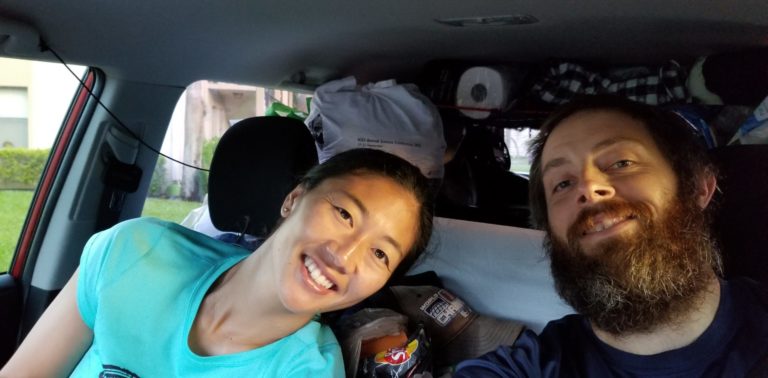
“Road trippin’ with my two favorite allies
Fully loaded we got snacks and supplies
It’s time to leave this town, it’s time to steal away
Let’s go get lost anywhere in the U.S.A.
Let’s go get lost, let’s go get lost…”
–Red Hot Chili Peppers, “Road Trippin’”
And so it began, bright and early(ish). We packed the car into the wee hours, debating every choice until the 4runner was fully loaded with only a small tunnel of a view out the rear window. We christened it with our newly minted Postcard Pangaea sticker and struck out on the great American pastime–the road trip. I have always wondered: did the American make the road trip or was it America itself? Ultimately, it might be a chicken or the egg kind of dilemma. America (the country, not to be confused with the continent and the first people who managed to coexist with nature for 1000s of years before white people came and F-ed it all up) was founded by restless spirits seeking new opportunities. First they crossed the Atlantic, then the continent. I guess it could be argued that it is in our blood–whether the nomadic native Americans or the slash and burn white folk. We have been endlessly seeking new lands, new opportunities, new beginnings. So, it was in that age old American tradition that we began our own Manifest Destiny: “Go West, young man [or woman], go West and grow up with the country.” Conversely, it might be read now as ‘go West, to escape your country’.
Thus, with that feeling of Americanism and self-righteousness, we hit the great American institution known as the Eisenhower Interstate Highway System, burning fossil fuels and hypocrisy in equal parts. I have similarly wondered if the concept of the American road trip was spurred by the great vastness of our country and our innate wanderlust or, more likely, incepted in our genes through the uniquely capitalist institution known as advertising. Phrased another way: did we need the car to fulfill our road trip desires or was the desire for a road trip implanted by the need to sell more cars? Either way, pounding out miles is ingrained in the blood of every American just like the desire for terrible fast food burgers and consumerism.

As the early enthusiasm sparked by Chumbawamba’s ‘Tubmthumper’ waned and the miles blurred past, I spent an inordinate amount of time reflecting on the implications and changes to America that, if not directly spurred by the highway, were certainly in tandem with the new age of American growth, expansion, and interconnectedness. It seems that the highway system fits perfectly with our ‘I need it now’ insta-culture. No longer is the road trip about the trip itself, but the destination and consumption of entities. It is a rush to get ‘somewhere’, which leads to an overlooking of the journey and people and places that make up our diverse country. As we were to find out somewhat to our dismay (though not total surprise), the iconicized ‘Route 66’ culture of the past is long gone. The highway system usurped the byway system. No longer is America celebrated through a rich tapestry of small towns and country inns, but instead gas stations and Super 8s. The general store has been replaced by the convenience store. It is no small bit of irony that the gas stations and car companies that created the dream of the American road trip vacation, and now glorify that bygone Route 66 era, were simultaneously subverting it.
The highways of America are an engineering marvel built for many purposes. Where would we be today without our Amazon Prime 2-day shipping? But, those same highways that connect the vastness of America spread across the country like opened veins spewing the lifeblood of capitalism, exhaust and waste, across our ever decreasing unspoilt lands. They get us to our destination, but there is a feeling of a hopeless decay to our endless westward march. At the end of every highway looms the smokestacks and highrises of the great American cities; that beacon of opportunity and new beginnings–if not greed and decay. With the highways came the urbanization of America and the end of small towns. On the one hand, endless population growth and economy of scale argue that the metropolis is inevitable. Yet, we shouldn’t let the economists write our eulogies for rural America.
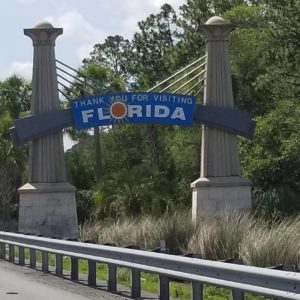

We raced through Florida (having done a road trip through the beautiful spring strewn north-central pinelands the previous winter) and approached the Gulf Coast of Alabama and Mississippi in the late afternoon. We began to search our beloved AAA roadmaps (yes, enormous, bulky, real paper, maps) for camping spots. Of course, we ran into our first COVID-related headaches when we realized that all federal lands east of the Rocky Mountains were essentially closed for overnight use. We eventually spotted a small state park that was still allowing camping, made a reservation online, and floored it through the humid Alabama lowlands. There is certainly an undeniable beauty to the endless estuaries and slowly flowing bayous of Alabama and the entire Gulf coast.
As we pulled off the interstate around Pascagoula, we were confronted with the gem of the American road system: the scenic byway. As the highways shuffle progress past what is left of ‘the rest’ of America, byways take you straight to the essence of what it is to be American. It shows you the hidden beauty and the real people left to run what was once the beating heart of American commerce and existence. They provide a glimpse into the America that has been left in the rearview mirror of ‘progress’. These roads connect the towns that were once the center of their worlds, but are now too often dismissed as ‘backwaters’. As a 20-something I felt that typical American urge to be ‘somewhere’; that pull towards a ‘great’ city. I couldn’t envision how anyone could want or choose to live ‘nowhere’. Then, after 5 years of Miami living, at some point I realized that despite all the ‘things’ going on in the big city, it didn’t make you feel any more a part of the world around you. It lacked interconnectedness.
Slow travel along the byways of America brought back the essence of that bygone age of travel; slow, personal–where people asked where you were heading and you weren’t afraid to ask how to get there. Unlike in the city, that sense of interpersonal connection and community was not yet lost. It made me realize that what those economists do not account for in their economy of scales is the mental health and well-being that comes with knowing your neighbor; looking out for one another. Progress might be zooming past at 70MPH, but cities will one day implode and the small towns of the world will be waiting with open arms to welcome their one-time youths back. The question is whether we will rebuild them in their traditions of unity and openness or our increasingly secular and distrusting approach to city dwelling.
Of course, that is the great American dilemma: you spend your entire life trying to run away from your small town just to realize that is where you were meant to be the whole time. And so, we keep moving from small town to city to new small towns. We envy the person rocking on the wrap around porches of America, simply because we know we never will be that person. We are just passing through, but, damn, for that minute, hour, day, life in that town seems like bliss, because we have a job–a life–waiting for us wherever we are heading. How would we feel if we grew up in this place or that, opportunities narrowly defined, chances to get out limited? Would we still want to be here, to return here? In the end, maybe that is really the American wanderlust essence–the coveting of our neighbor’s life; the striving for what that person has without seeing the big picture; a narrow minded desire, often for just an instant, for an existence that we know we will never actually try to achieve or even want if we were to attain it. So, in short, coveting, wanting, yearning–the hallmarks of consumerism in the end.
For now, though, the slowly fading sun filtering through the spanish moss of the vast live oaks put all thoughts of city dwelling and hypocrisy behind us. Here we were experiencing the faded glory of America, road trippin’. We rolled down the windows and let the early evening humidity steam our pores–a sauna for the soul. As the Pascagoula River bayou came in and out of view behind white plantation homes and wrap around porches, we embraced the slowing pace of life–let the frenetic energy of the highway continue on to its next destination of New Orleans. We pulled into Shepard State Park and settled into our campsite for our first night on the road. I took off my shirt and cracked my first Miller Lite, embracing the outdoors, the heat, humidity, the intriguing mixture of smells reflecting the surrounding pines and salty air. The park turned out to be a perfect, quiet gem. We hiked through the pines, explored the wetlands, and just enjoyed the outdoors (though the humidity and bugs reflected what we were trying to leave behind in FL; one last reminder of why we were getting out).
And thus we came to the realization that we packed waaaay too much. The purpose of building the platform bed was to be able to quickly transform from driving to sleeping. However, mainly due to the ridiculous amount of food we brought (among other items), the transition took about 30min and involved a lot of shoving of items in every nook and cranny and piling the front seats full of junk. After a few weeks of eating and figuring out the best configuration for sleeping, we had it down to a couple minutes. But, the first night was an interesting one. After the conversion, we made a fancy dinner of scallops with a butter and garlic sauce over pasta; we went all out (and also had to finish what was left from our fridge). Given the heat and humidity we didn’t have a fire (our bundle of wood wound up making it all the way to Utah before we could burn it) and collapsed in bed with all the windows open and our bug nets on. Even with our small fan plugged into our portable battery, the humidity was stifling. When the battery ran out around 3am, it became hard to breathe–like drowning on land. Needless to say the first night, although delightfully peaceful with the lively serenade of the southern woods, was not as restful as we had hoped. In fact, it left such a bad taste in our mouth (between the amount of time to transition and the incredible heat) that we almost gave up on the whole sleeping in the car thing. Our goal had always been to speed across the SE as quick as possible, so we didn’t have much hope for anything amazing to see or happen, but our spirits were certainly lagging after the first night of swamp sleep.
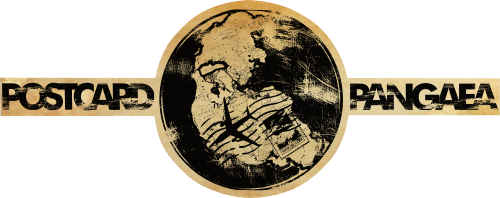
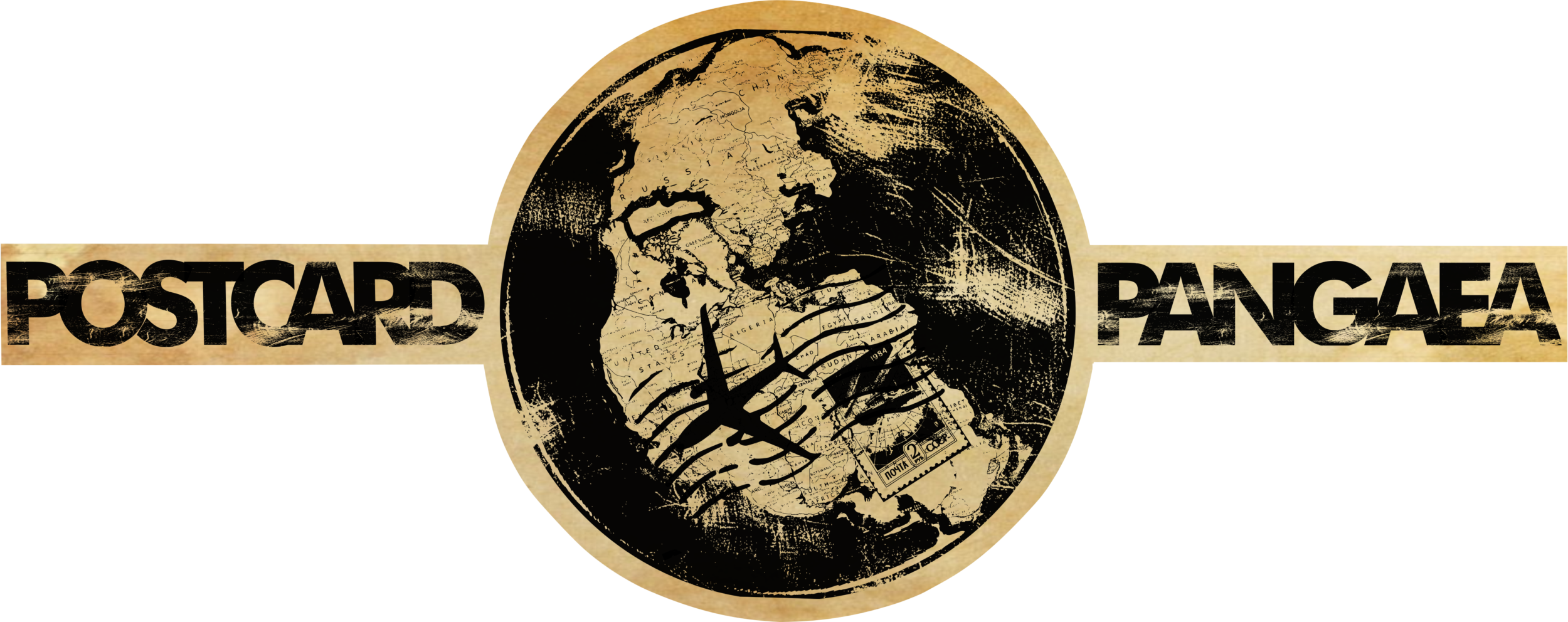
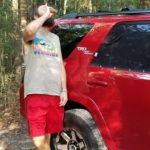
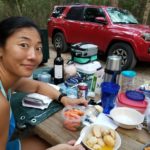
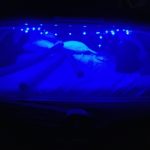
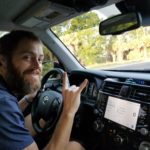
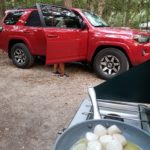
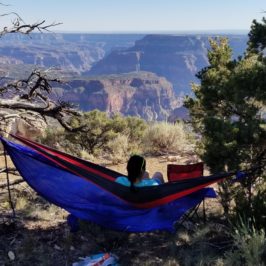


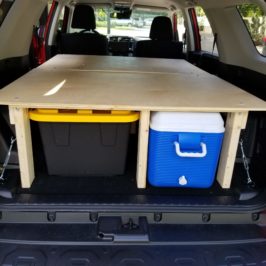
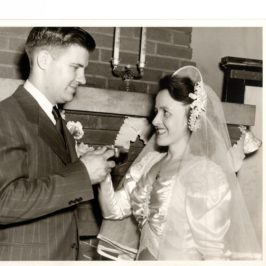

Leave a Reply